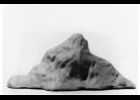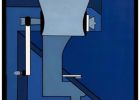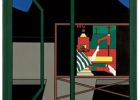Figures of Nihilism in Vilém Flusser’s Philosophy
This essay focuses on the role of nihilism in the development of Vilém Flusser’s work, a notion that plays a major role at the beginning of his intellectual adventure and keeps resurfacing in various guises and different moments. Nihilism is linked to certain people and the work of certain philosophers: to his friend Alex Bloch and the work of Albert Camus, Friedrich Nietzsche, and Vicente Fereira da Silva. It appears in The History of the Devil, the autobiography Bodenlos and Vampyroteuthis Infernalis. Nihilism is connected to a series of topics: the forces of negativity and denial, the absurdity and groundlessness of human existence, the meaninglessness of life and the temptation of suicide, the concept of nothingness in Jewish thinking and the void in Oriental philosophy, the devil and the diabolical abyss, Mephistopheles and the infernal octopus at the bottom of the sea, and finally the zero-dimensionality of pixels and the principle of entropy. Flusser repeatedly spoke of himself in Mephistophelian terms and called his life in Brazil a diabolical existence. Samson Flexor painted a portrait of Vilém Flusser that strongly accentuated the diabolical side of his person. Louis Bec’s various species of Vampyroteuthis Infernalis represent different sides of Flusser’s thinking.
Gesto das Pedras: da fenomenologia flusseriana às coisas de Wanda Pimentel
This essay explores the enigma of gestures through the works of Vilém Flusser and the Brazilian painter Wanda Pimentel by starting from the paradoxical assumption that a rock can perform a gesture. Some paintings from Pimentel’s series Envolvimentos (Entanglements) and Montanhas do Rio (Mountains of Rio) reveal a sort of ambiguous expressiveness of legs, rocks, windows, clothes, and other objects. They seem to be endowed with that which Flusser called the “artificiality” of gestures.
A Modest Proposal for the Saponification of Fats: On the Role of Satire in Vilém Flusser’s Work
The starting point of this essay is an interview with Andreas Müller-Pohle and Volker Rapsch (August 1988), in which Flusser defined his writing style as satirical and Vampyroteuthis infernalis as a satirical text. In the interview, Flusser also speaks of academic seriousness as a role to be played, questioning simple notions of authorial objectivity. Flusser’s comment has far reaching consequences for the interpretation of his other writings and raises a series of questions: Was he trying to influence the reception of his new book Angenommen that would be published only one year later, or did he want to reorient the way his books were being read in Germany at the time? Is there an ironical, fabulatory undertone in all his writings even those considered to be straightforward comments on communication and media theory? The first part of the essay discusses some elements of Flusser’s use of satire and compares his short satirical text “Verseifung” (Saponification) with Jonathan Swift’s “Modest Proposal”. The second part deals with Flusser’s satirical use of animal characters (ants, unicorns, the taenia solium, and the imaginary hybrid creature Bibliophagus convictus) in his philosophical fables and their relationship to the Vampyroteuthis infernalis.
Experiment und Versprechen – Über die Entgrenzung des Denkens
A speculative impulse is inherent in or precedes every experiment, presumably every thought. The hoped-for promise of an answer, a solution, a proof, is thus built on an idea of mental outgrowth. It is characterised by not-knowing, from which it takes its course (cf. Busch et al. 2020). The starting point of this paper is the experiment Vampyroteuthis infernalis (Flusser / Bec 1987) as a model of a fabulatory, creative epistemology (Bozzi 2007), which at the same time functions as a symbol of human existence in postmodernity. Part scientific treatise, part parody, part philosophical discourse, part fable, this work presents itself as an im/possible form of speculative research and exploratory speculation at the same time. Flusser thus provides fruitful impulses for the persistently discussed approaches of experimental and practice-based research in the formative disciplines, such as design, art or architecture, which are discussed in this paper as well as a possibly related disruption of knowledge hegemonies.
Flusser’s Vampyrotheutic Sublime
This short essay suggests that Flusser found in the Vampire Squid a modern sublime: an animal that escapes instrumental mentality and creates a human fear of the unknown. In Vampyroteuthis Infernalis Flusser discussed the cephalopod, which he imagined to be a giant “beast,” and its deep-sea habitat. He was aware of the impossibility of the two species, Vampyroteuthis Infernalis and human, to meet. Such meeting would sublate the subject-object relationship. While he respects the vampire squid and its inhuman Umwelt, Flusser still imagines the creature as an impossibly powerful, alien thing. In this regard, Vampyroteuthis Infernalis and the greatness of its abyss unfold the sublime.
Vampyroteuthis Infernalis, le podcast comme format de recherche-création
For this special issue of Flusser Studies on Vilém Flusser's relations with France, I would like to propose a research-creation format, which is embodied in a podcast that is part of the Bio Is The New Black series. The podcast is a creation based on reading the Vampyroteuthis Infernalis and research conducted at the Vilém Flusser Archive in Berlin under the supervision of Anita Jóri. Bio Is The New Black is a podcast around design, biology and technology that invites artists, designers, philosophers, scientists and engineers to explore the multiple ethical, critical and creative questions that arise with bio-manufacturing technologies.
Flusser e as ondas abissais
In Vilém Flusser’s books, Judaism is viewed not only as a religion, but also as a specific culture that allows the author to treat the issue of evil in universal terms from a perspective that reveals itself to be Jewish and Post-Shoah.
Ficção Filosófica e Perspectivismo Ameríndio: Diálogos conceituais entre Vilém Flusser e Eduardo Viveiros de Castro
Based on the theoretical contribution of Vilém Flusser to the themes of identity and identification, this article approximates Flusserian thought and the Amerindian perspectivism of the Brazilian anthropologist Eduardo Viveiro de Castro. It argues, on the basis of the book Vampyroteuthis Infernalis, that Flusser performs an exercise in perspectivism, as he proposes an imaginative experience allowing readers to adopt the point of view of another nonhuman being, in this case, the octopus.
5. Zoosystematica profundorum – Experimental Studies in Deep Sea Communication
The installation Varia Zoosystematica Profundorum models a specific notion of how deep sea communication between specimens and across species might happen, inspired by the work of zoosystematicien Louis Bec and philosopher Vilém Flusser. The video of the installation featured here, is a documentary of the version of the installation shown at the Singuhr Hörgalerie, Großer Wasserspeicher in Berlin, during the SuperCollider conference in Berlin in 2010.
“Acheronta movebo”: On the Diabolical Principle in Vilém Flusser’s writing
This paper explores what might be called the ‘diabolical principle’ in Vilém Flusser’s work, tracing its evolution from the early Brazilian to the last German texts. If God, as the German mystics asserted, is basically ineffable and, thus, comparable to absolute nothingness, the devil – at least within Western civilization – stands for the ultimate frailty and absurdity of all human endeavors, that is, for language, history, progress, and for our continuous attempts to create sense and impose form on the unfathomable nothingness surrounding us. Western history, according to Flusser, is basically a diabolical pursuit.
Flusser made use of the figure of the devil in A historia do diabo, first published in 1965, reinterpreting the history of the West from a diabolical point of view. The figure of the devil, the fallen angel inhabiting the dark abysses, however, plays also a major role in Vampyroteuthis infernalis, published in 1987, twenty-two years later. In the second text, it is the devil wearing the mask of Lucifer, the light-bearer.










